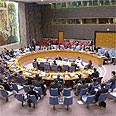
Security Council to review Iran nuke case
Five permanent U.N. Security Council members reach surprising agreement Tuesday to bring Iran's nuclear case before council for review. In statement, members call on International Atomic Energy Agency to report to council ' the situation in Iran and the way the Iranian authorities are not cooperating with the international agency'
The United States and the other four permanent members of the U.N. Security Council reached surprising agreement Tuesday that Iran should be hauled before that powerful body over its disputed nuclear program.
China and Russia, longtime allies and trading partners of Iran, signed on to a statement that calls on the U.N. nuclear watchdog, the International Atomic Energy Agency, to transfer the Iran dossier to the Security Council, which could impose sanctions or take other harsh action.
The IAEA meets in Vienna on Thursday.
Though the United States, Britain and France have been pressing to hand Iran's case to the Security Council, it had been unclear until now whether China and Russia would support such a move.
The foreign ministers from the five nations said, however, the Security Council should wait until March to take up the Iran case, after a formal report on Tehran's activities from the atomic agency.
Secretary of State Condoleezza Rice and her counterparts discussed Iran at a private dinner at the home of British Foreign Secretary Jack Straw. After the four-hour meeting, which spilled over into the early hours Tuesday, a joint statement called on the IAEA to report the Iran case at the meeting Thursday.
Members can veto action
With support from Germany and the European Union, whose foreign ministers also attended the dinner, the overall agreement amounted to a compromise — take the case to the Security Council but allow a short breather before the council undertakes what could be a divisive debate.
Any of the five permanent members of the Security Council, all nuclear powers themselves, can veto an action voted by the full council membership.
The group agreed that the IAEA "should report to the Security Council its decision on the steps required of Iran, and should also report to the Security Council all IAEA reports and resolutions as adopted relating to this issue," a statement from the group said.
The IAEA has already found Iran in violation of nuclear obligations and issued a stern warning to Tehran in September. Thursday's vote would be the next step, one long sought by the United States.
'Russia and China reluctant at first'
Iran insists its nuclear program is intended only to produce electricity. The United States and some allies say Iran is hiding ambitions to build a nuclear bomb, but the Security Council members have been divided about how strong a line to take.
It is still not clear how Russia and China would vote if the questions of sanctions came before the Security Council. It is also not clear that the United States will win the broad international consensus it seeks when the IAEA votes.
The IAEA "will report on the situation in Iran and the way the Iranian authorities are not cooperating with the international agency," said a French government official, speaking on the customary condition of anonymity.
He said the Russian and Chinese ministers had initially been reluctant to agree to refer Iran to the Security Council, but were persuaded of the need for the council members to show a united front.
"It was very important to make sure they are all together on this issue and all agree on the same position."
"This is in the hands of the IAEA," U.N. spokesman Stephane Dujarric said of the agreement. "We're not going to say anything at this point."
A call to Iran's U.S. mission in New York on Monday night was not answered.
There was no immediate comment from Chinese officials in Beijing.
On Monday, Rice said the world agreed that Iran should not have the means of developing a nuclear weapon, and she criticized Iran's response to Russian attempts to mediate in the standoff.
"We believe that there is a lot of life left in the diplomacy," Rice said. "After all, going to the Security Council is not the end of diplomacy. It's just diplomacy in a different, more robust context."










